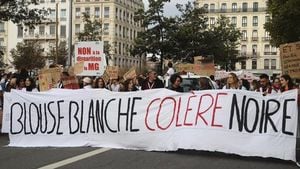As the dust settles on the recent federal election in Canada, voters in Nova Scotia and Kenora-Kiiwetinoong are reflecting on their experiences and the outcomes that will shape their communities in the years to come. On April 28, 2025, Elections Canada reported a smooth election day in Nova Scotia, where approximately one in four eligible voters cast their ballots in advance polls, indicating a strong engagement with the democratic process.
In Halifax, CBC's Andrew Lam spoke with several voters on election day, capturing their sentiments about the electoral process. Many expressed satisfaction with the organization and efficiency of the voting procedures, highlighting the importance of a seamless experience in encouraging voter participation. The positive feedback from voters in Halifax stands in contrast to the challenges that often accompany election days, such as long lines and confusion over polling locations.
Meanwhile, in Kenora-Kiiwetinoong, Conservative candidate Eric Melillo has been re-elected for a third term, marking a significant moment in his political career. With 145 out of 157 polls reporting at 12:55 a.m. on April 29, 2025, Melillo secured just under 50 percent of the 23,264 votes counted. His closest competitor, Liberal candidate Charles Fox, garnered approximately 35 percent, while New Democrat Tania Cameron received 13 percent. The Green Party's Jon Hobbs managed about one percent of the vote, with both the People’s Party of Canada candidate Bryce Desjarlais and Independent candidate Kelvin Boucher-Chicago receiving less than one percent.
Melillo's victory is particularly noteworthy as he has shown increasing support from constituents over his three terms. He first entered office in 2019 with just 34 percent of the vote, and his support grew to 43 percent in the 2021 election. This upward trajectory reflects his efforts to address critical infrastructure projects, support for Indigenous communities, and economic opportunities for all in the region.
Fox, a Bearskin Lake First Nation member and former Nishnawbe Aski Nation grand chief, shared his appreciation for the campaign experience, stating, "I really enjoyed being the Liberal candidate. I got to meet a lot of my old friends." His campaign took him to various First Nations communities, including Kasabonika Lake, Kitchenuhmaykoosib Inninuwug, and Sandy Lake, where he previously served as grand chief. Fox acknowledged the effective campaign run by Melillo, noting, "You know, wherever I went in the municipalities there was a lot of support for Eric, and I can understand that."
Cameron, who is also a member of Niisaachewan Anishinabe Nation and serves as the chief executive officer at Wiigwas Elders and Senior Care in Kenora, expressed disappointment with the election results but maintained respect for the democratic process. "Obviously I’m disappointed with the results," she said. "But the people have chosen. We live in a democracy and the people have chosen, and I respect that." Cameron's fourth attempt at securing a seat in the House of Commons was marked by her commitment to connecting with constituents, as she stated, "I believe I did the best I could and I logged in the mileage and put in the steps and met a lot of people and had great discussions on the doorstep, but I fell short. But I’m still proud of my campaign."
Desjarlais, representing the People’s Party of Canada, remarked on the brevity of the campaign period, suggesting it was "a little too short, to be honest," but expressed satisfaction in helping to spread the party's conservative message. Boucher-Chicago, an Independent candidate, shared his perspective on the campaign experience, stating, "I guess I did get the message out there," while also expressing concern over the lack of progress on issues he cares about, particularly regarding homelessness.
The election was called on March 23, 2025, and saw a total of 343 seats contested nationwide due to boundary redistribution, with five additional seats added. At the time of dissolution, the Liberals held 153 of the 338 seats in the House of Commons, the largest number of any party but not enough for a majority. The results from Kenora-Kiiwetinoong reflect a broader trend in Canadian politics, where regional support varies significantly across the country.
As the newly elected officials prepare to take their seats, the focus will shift to how they will address the pressing issues facing their constituents. Voter engagement, as evidenced by the turnout in Nova Scotia and the competitive races in Kenora-Kiiwetinoong, suggests that Canadians are eager to see their voices represented in government. The upcoming legislative sessions will likely be pivotal in shaping policies that affect everything from infrastructure development to Indigenous rights and economic opportunities.
In conclusion, the recent elections in Nova Scotia and Kenora-Kiiwetinoong have not only showcased the democratic process at work but also highlighted the importance of voter engagement and the need for elected officials to be responsive to the diverse needs of their constituents. As Canada moves forward, the outcomes of these elections will undoubtedly play a crucial role in determining the direction of policy and governance in the coming years.




